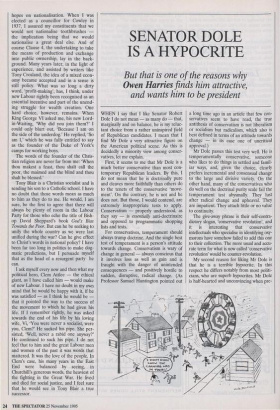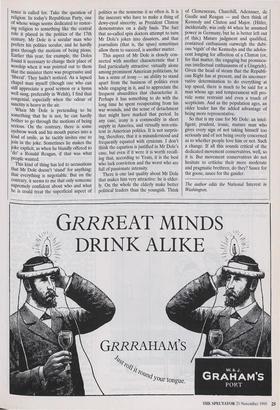SENATOR DOLE IS A HYPOCRITE
But that is one of the reasons why Owen Harries finds him attractive,
and wants him to be president
WHEN I say that I like Senator Robert Dole I do not mean — as many do — that, marginally and on balance, he is my reluc- tant choice from a rather uninspired field of Republican candidates. I mean that I find Mr Dole a very attractive figure on the American political scene. As this is decidedly a minority view among conser- vatives, let me explain.
First, it seems to me that Mr Dole is a much better conservative than most con- temporary Republican leaders. By this, I do not mean that he is doctrinally pure and cleaves more faithfully than others do to the tenets of the conservative 'move- ment'. On the contrary, he is not and he does not. But those, I would contend, are extremely inappropriate tests to apply. Conservatism — properly understood, as they say — is essentially anti-doctrinaire and opposed to programmatic shopping lists and tests.
For conservatives, temperament should always trump doctrine. And the single best test of temperament is a person's attitude towards change. Conservatism is wary of change in general — always conscious that it involves loss as well as gain and is fraught with the danger of unintended consequences — and positively hostile to sudden, disruptive, radical change. (As Professor Samuel Huntington pointed out a long time ago in an article that few con- servatives seem to have read, the true antithesis of conservatism is not liberalism or socialism but radicalism, which also is best defined in terms of an attitude towards change — in its case one of uncritical approval.) Mr Dole passes this test very well. He is temperamentally conservative, someone who likes to do things in settled and famil- iar ways, and, given the choice, clearly prefers incremental and consensual change to the large and divisive variety. On the other hand, many of the conservatives who do well on the doctrinal purity scale fail the temperament test abysmally. They lust after radical change and upheaval. They are impatient. They attach little or no value to continuity.
The give-away phrase is their self-contra- dictory slogan, 'conservative revolution', and it is interesting that conservative intellectuals who specialise in identifying oxy- morons have somehow failed to add this one to their collection. The more usual and accu- rate term for what is now called 'conservative revolution' would be counter-revolution.
My second reason for liking Mr Dole is that he is a terrible hypocrite. In this respect he differs notably from most politi- cians, who are superb hypocrites. Mr Dole is half-hearted and unconvincing when pre- tence is called for. Take the question of religion. In today's Republican Party, one of whose wings seems dedicated to restor- ing religion to something like the central role it played in the politics of the 17th century, Mr Dole is a secular man who prefers his politics secular, and he hardly goes through the motions of being pious. Earlier this year, for example, the Doles found it necessary to change their place of worship when it was pointed out to them that the minister there was progressive and `liberal'. They hadn't noticed. As a lapsed chapel man myself (though one who can still appreciate a good sermon or a hymn well sung, preferably in Welsh), I find that congenial, especially when the odour of sanctity is heavy in the air. When Mr Dole is pretending to be something that he is not, he can hardly bother to go through the motions of being serious. On the contrary, there is some eyebrow work and his mouth purses into a kind of smile, as he tacitly invites one to join in the joke. Sometimes he makes the joke explicit, as when he blandly offered to `do' a Ronald Reagan, if that was what people wanted.
This kind of thing has led to accusations that Mr Dole doesn't 'stand' for anything; that everything is negotiable. But on the contrary, it seems to me that only someone supremely confident about who and what he is could treat the superficial aspect of politics as the nonsense it so often is. It is the insecure who have to make a thing of dewy-eyed sincerity, as President Clinton demonstrates on a daily basis. The fact that so-called spin doctors attempt to turn Mr Dole's jokes into disasters, and that journalists (that is, the spun) sometimes allow them to succeed, is another matter.
This aspect of Mr Dole is closely con- nected with another characteristic that I find particularly attractive: virtually alone among prominent American politicians, he has a sense of irony — an ability to stand apart from the business of politics even while engaging in it, and to appreciate the frequent absurdities that characterise it. Perhaps it has something to do with the long time he spent recuperating from his war wounds, and the sense of detachment that might have marked that period. In any case, irony is a commodity in short supply in America, and virtually non-exis- tent in American politics. It is not surpris- ing, therefore, that it is misunderstood and frequently equated with cynicism. I don't think the equation is justified in Mr Dole's case, but even if it were it is worth recall- ing that, according to Yeats, it is the best who lack conviction and the worst who are full of passionate intensity. There is one last quality about Mr Dole that makes him very attractive: he is elder- ly. On the whole the elderly make better political leaders than the youngish. Think of Clemenceau, Churchill, Adenauer, de Gaulle and Reagan — and then think of Kennedy and Clinton and Major. (Hitler, incidentally, was only 44 when he assumed power in Germany, but he is better left out of this.) Mature judgment and qualified, contained enthusiasm outweigh the dubi- ous `vigah' of the Kennedys and the adoles- cent longing for affection of a Clinton (or, for that matter, the engaging but promiscu- ous intellectual enthusiasms of a Gingrich). Given the head of steam that the Republi- can Right has at present, and its unconser- vative determination to do everything at top speed, there is much to be said for a man whose age and temperament will pro- vide some restraint and even a touch of scepticism. And as the population ages, an older leader has the added advantage of being more representative.
So that is my case for Mr Dole: an intel- ligent, prudent, ironic, mature man who gives every sign of not taking himself too seriously and of not being overly concerned as to whether people love him or not. Such a change. If all this sounds critical of the dedicated movement conservatives, well, so it is. But movement conservatives do not hesitate to criticise their more moderate and pragmatic brethren, do they? Sauce for the goose, sauce for the gander.
The author edits the National Interest in Washington.



















































































 Previous page
Previous page